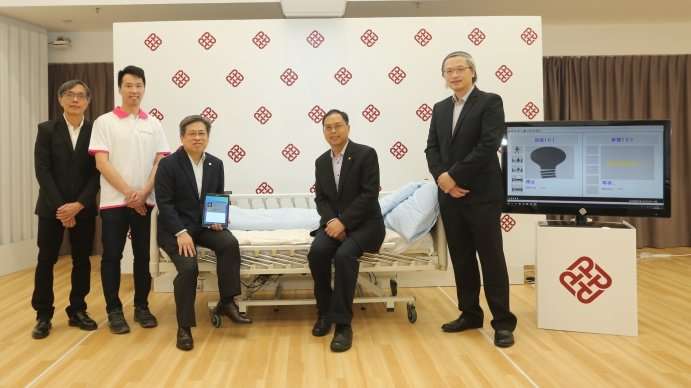Team develops system for the nighttime monitoring of elderly with dementia

The Hong Kong Polytechnic University (PolyU) has developed eNightLog, a multi-function nighttime monitoring system for elderly with dementia, to track their respiration and activities in bed for preventing fall or wandering away. The safe, non-restraint system was designed for the typical environment of nursing homes in Hong Kong, and will greatly improve the quality of life for elderly patients while enhancing the efficiency and lessening the workload of healthcare personnel.
It is projected that the number of people aged 65 and above in Hong Kong will reach around 2.5 million by 2040, about one-third of the overall population. Among the elderly at that time, around 332,700, or one out of 10, would suffer from dementia, triple the figure from 2009. The most common type of dementia is Alzheimer's disease, characterized by the gradual deterioration of mental capacities, including memory, judgment and communication ability, as well as usual symptoms of depression, agitation and sleep disturbances.
The eNightLog system was developed by a research team led by Ir Professor Zheng Yongping, head of the Department of Biomedical Engineering (BME) at PolyU and Henry G. Leong Professor in Biomedical Engineering.
"By helping various nursing homes to set up the eNightLog system we developed, we hope to contribute our expertise for helping create an age-friendly society," said Professor Zheng.
The eNightLog system is embedded with event sequence tracking and different kinds of remote sensing and imaging technologies. The system is based on innovative algorithm developed by the BME team of PolyU. Seventeen systems have been installed and tested in a nursing home over two months this year for nighttime monitoring. During this period, 380 incidences of patients leaving bed alone were recorded, all successfully detected (100 percent), and only two incidents of false alarm occurred (0.5 percent). In addition, the system recorded 525 events of caregivers responding to nighttime wandering, an accuracy rate of 100 percent.
The eNightLog system includes following sensors to detect different activities of the elderly in bed:
- Near Infrared 3-D sensor tracks the resident's position and posture (lying down, sitting on bed or bedside, standing beside the bed, rising) and caregivers' visits. It thus prevents the resident from falling and wandering, and improves staff response time. The algorithm can also detect caregivers paying night visits to the elderly, thus avoiding false alarms.
- Ultra-Wideband (UWB) Impulse Radar sensor detects small motions including respiration rate to identify the resident's health condition and sleep quality. It functions even under bedding.
- Environment sensor provides ambient measurements and controls such as room temperature and light control.
The activity status and alarms are transmitted in the form of text, icons or processed infrared images, and are displayed on the caregivers' computer stations or mobile devices. Signals detected beyond the preset normality range will trigger an alarm for caregivers to take immediate action. The research team will soon extend the functions of eNightLog system to detecting heart rate and body temperature, and connect the system with smart devices such as electronic diapers. In addition, the system can also link with an ultrasound bladder volume detector to facilitate caregivers to take better care of their residents, especially in handling urinary incontinence. The team is exploring big data analysis to provide more preventive information for health care of elderly.
"Being a multi-sensing system and platform, eNightLog is greatly scalable in connecting with other devices, including wearable, non-contact or remote-control ones. The further applications and development of eNightLog with advancing rehabilitation health technologies can be very promising," said Dr. Eric Tam.




















